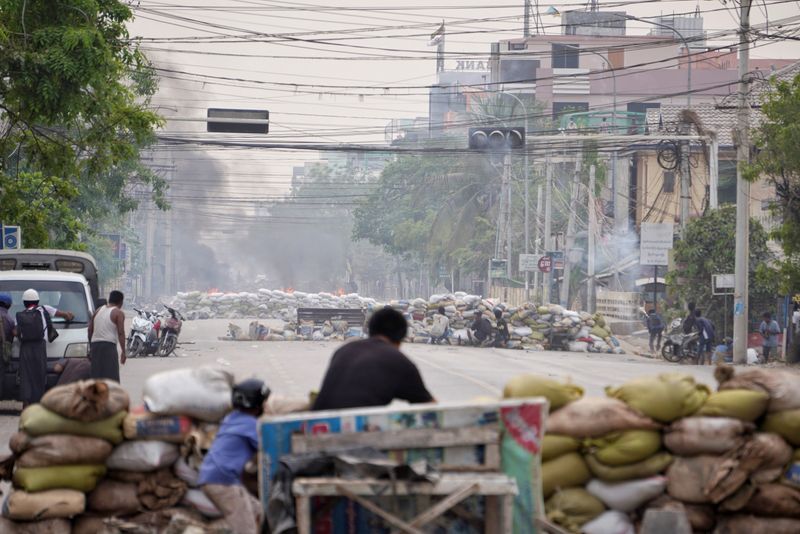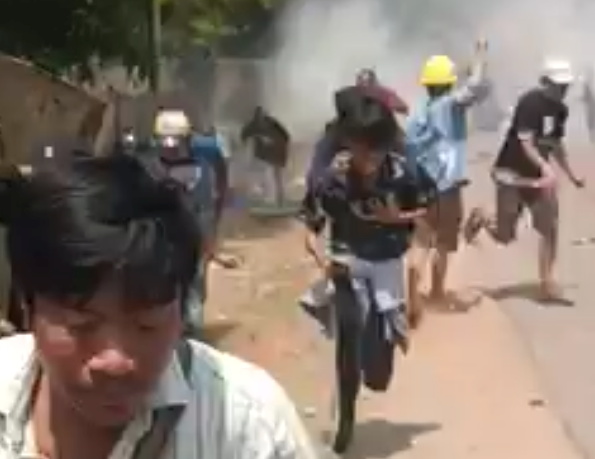(Reuters) - Demonstrators in Myanmar maintained their unflinching opposition to military rule on Sunday despite a rising death toll at the hands of security forces as the junta appeared equally determined to resist growing outside pressure to compromise.
One man was killed and several were wounded when police opened fire on a group setting up a barricade in the central town of Monywa, a doctor there said as a community group issued a call on Facebook (NASDAQ:FB) for blood donors.
The violence that has followed a Feb. 1 coup, which came after a decade of tentative steps towards democracy in Myanmar, has forced many citizens to think up novel ways to make their stand as they resist a return to military rule.
Protesters in nearly 20 places across the country staged candle-lit protests on Saturday night and Sunday night, from the main city of Yangon to small communities in Kachin State in the north, Hakha town in the west and the southernmost town of Kawthaung, according to a tally of social media posts.
Hundreds of people in the second city of Mandalay, including many medical staff in white coats, marched before sunrise in a "Dawn protest", video posted by the Mizzima news portal showed.
"Failure of the military regime, our cause our cause ... federal democracy, our cause our cause,” the crowd chanted as the sky was beginning to brighten and birds called from the trees lining the otherwise deserted streets.
Protesters in some places were joined by Buddhist monks holding candles while some people used candles to make the shape of the three-fingered protest salute.
Others came out later on Sunday, including the crowd in Monywa, where police opened fire.
"Sniper, sniper," people can be heard shouting in a video clip shortly after the man was shot in the head and more shots rang out.
The spokesman for the junta was not available for comment but has previously said security forces have used force only when necessary.
With the latest killing, the death toll since the coup rose to at least to 248, based on a tally by the Assistance Association for Political Prisoners activist group.
State media said on Sunday that men on motorbikes attacked a member of the security forces who later died. The military said two policemen were killed in earlier protests.
'FOREIGN INSULTS'
The junta says a Nov. 8 election won by Nobel peace laureate Aung San Suu Kyi's party was fraudulent, an accusation rejected by the electoral commission. The military leaders have promised a new election but have not set a date.
Western countries have repeatedly condemned the coup and the violence. Asian neighbours, who have for years avoided criticising each other, have also begun speaking out.
Indonesian President Joko Widodo, in some of the strongest comments yet by a regional leader, said on Friday the violence should stop immediately. He called for an urgent meeting of Southeast Asia's regional grouping, of which Myanmar is a member.
Malaysian Prime Minister Muhyiddin Yassin backed the call, saying he was appalled by the persistent use of lethal violence against civilians. Singapore has also expressed disapproval.
The military has shown no sign of being pressed into back-tracking on its coup, which derailed a slow transition to democracy in a country that was under strict military rule from a 1962 coup until the generals initiated reforms a decade ago.
Coup leader General Min Aung Hlaing on Saturday visited the Coco islands, one of Myanmar's most strategically important outposts, 400 km (250 miles) south of Yangon, and reminded members of the armed force there that their main duty was to defend the country against external threats.
The state-run Kyemon newspaper prominently featured a quote from independence hero Aung San, Suu Kyi's father, who in 1947 said: "It is everyone's duty to sacrifice their lives and defend and fight back against foreign countries' insults."
Suu Kyi, 75, faces accusations of bribery and other crimes that could see her banned from politics and jailed if convicted. Her lawyer says the charges are trumped up.

Australia's SBS News reported that two Australian business consultants were detained as they tried to leave Myanmar, but it was not clear why. The broadcaster quoted an Australian foreign ministry spokeswoman as declining to comment on the two for privacy reasons.
